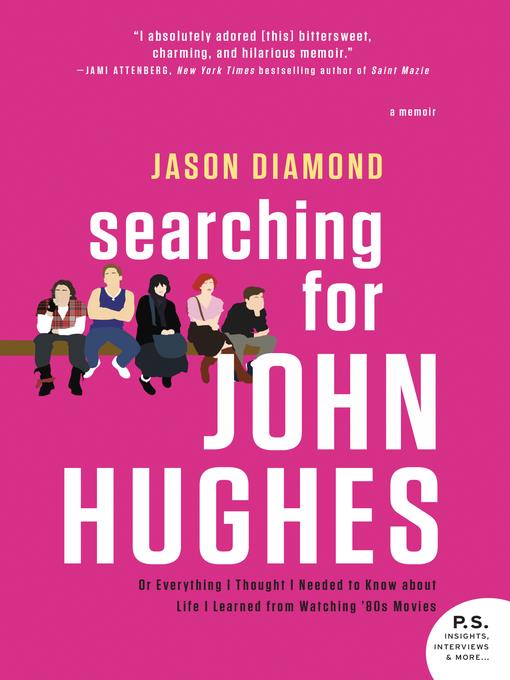
Searching for John Hughes
Or Everything I Thought I Needed to Know about Life I Learned from Watching '80s Movies
کتاب های مرتبط
- اطلاعات
- نقد و بررسی
- دیدگاه کاربران
نقد و بررسی

September 12, 2016
In his memoir, Rolling Stone editor Diamond relates the story of his failed attempt to write a biography of director John Hughes while working in Manhattan coffee shops and being almost too pretentious to stomach. Diamond grew up in the Chicago suburbs that inspired much of Hughes’s early work and escaped a broken home (abusive father, runaway mother) to scrape by in New York City, where he eventually began compiling his biography of Hughes. In between depressive episodes and alcohol-fueled bad decisions, Diamond plugs away at the book; when no sources are forthcoming, he resorts to lying to publicists, stalking, and outright inventing tales of Hughes’s day-to-day life (which, alongside factual discrepancies, make it difficult to discern any truth from Diamond’s accounts) to move the manuscript forward. All this, combined with Diamond’s disdain for (and discomfort with) everyone around him, makes it extremely difficult to empathize with him as a 20-something. Diamond’s book may appeal to Hughes die-hards, but readers simply looking for a fresh memoir should look elsewhere.

September 15, 2016
A Brooklyn-based writer and editor's memoir about how watching John Hughes films as an adolescent gave meaning to his troubled life.Rolling Stone sports editor Diamond grew up a member of the Jewish minority in suburban Chicago. For the first few years of his life, his mother and his candy manufacturer father lived an American dream that included "two cars [and]...a house...built with the money made from rotting the teeth of children who could only afford to spend a quarter on snacks." His life changed dramatically after his parents divorced. By the time he was 7, he had attended four different schools and become "the weird kid [whom] nobody knew." It was then that a babysitter introduced him to Hughes' Pretty in Pink, which immediately became his favorite film for the comfort it gave him that even kids who were different could "still be cool." As Diamond grew older and began watching more of Hughes' movies, he found that they helped him to make sense of things like the social divisions in high school, where "everyone had his or her place, just like in a Hughes movie." But then his mother, who could not cope with their rocky, adversarial relationship, moved away and left her son to fend for himself. Clinically depressed, homeless, and often drunk or high, Diamond turned even more to Hughes' feel-good films to help him make sense of an unforgiving world. He then moved to New York, where he decided that he would write the director's biography. After spending most of his 20s bouncing between Chicago and New York, often unhappy and endlessly revising a book he would never publish, his life finally came together. Both funny and heartbreaking, Diamond's memoir is not just an account of how one director's films impacted--and perhaps saved--his life. It is also a memorable reflection on what it means to let go of the past and grow up. A quirkily intelligent memoir of finding oneself in movies.
COPYRIGHT(2016) Kirkus Reviews, ALL RIGHTS RESERVED.

October 15, 2016
Growing up in the idyllic Chicago suburbs where director John Hughes set so many of his movies, Diamond was first introduced to Hughes when his babysitter showed him Sixteen Candles on video. Though it launched a lifelong love of the director's work for Diamond, his own childhood didn't mesh with the life Hughes glorified. Diamond's father was brutally abusive to him, and his mother (who eventually won sole custody) abandoned him by moving away while he was in high school. Diamond managed to couch surf before being taken in by a sympathetic teacher. After graduation, Diamond relocated to New York and found work as a barista while his desire to be a writer and pen a biography of Hughes, his idol, crystallized. But as Diamond labored on the manuscript, he struggled with depression and insecurity about his career and life in comparison with those of the privileged peers he grew up with. Children of the 1980s and anyone who has worked for years to make a dream come true will recognize themselves in Diamond's candid, grounded, relatable memoir.(Reprinted with permission of Booklist, copyright 2016, American Library Association.)

























دیدگاه کاربران